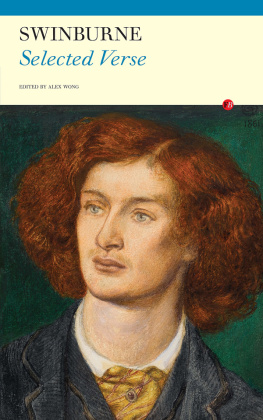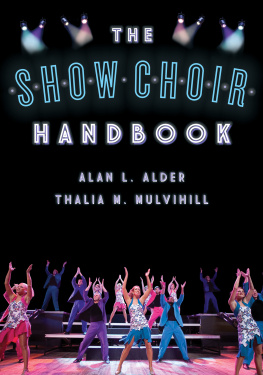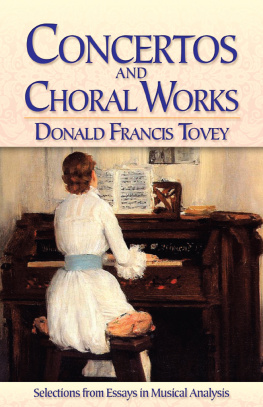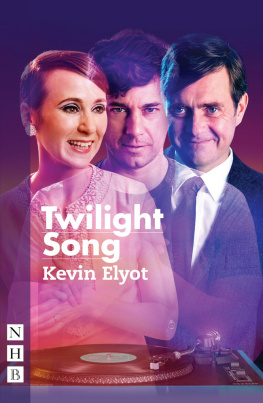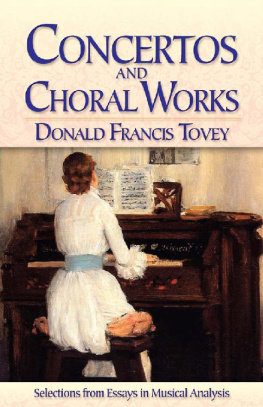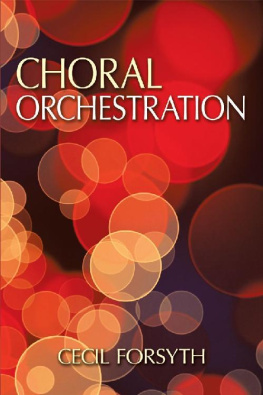Selected Verse
ALGERNON CHARLES SWINBURNE was born in London in 1837 to an aristocratic family. As an undergraduate in Oxford, he made the acquaintance of D. G. Rossetti, William Morris and Edward Burne-Jones, all of whom would influence his work. Returning to London without having completed his degree, he continued to associate with many leading figures of the Aesthetic Movement. The dramatic poem Atalanta in Calydon (1865) established his literary reputation, and he followed this success with a collection, Poems and Ballads (1866), which made him the most controversial English poet of the day. Many other volumes followed, including Songs Before Sunrise (1871), two more series of Poems and Ballads (1878 and 1889), the Arthurian epic Tristram of Lyonesse (1882), and several plays. Swinburne was also an important critic of modern and early-modern literature. During his two decades in London (1860-1879), his bohemian lifestyle was infamous, and the period was marred by ill-health and alcoholism. In 1879 his friend Theodore Watts-Dunton brought him to his own home in Putney, where he could be looked after. Here Swinburne remained, still writing, until his death in 1909.
ALEX WONG studied English literature at the University of Cambridge, completing his doctoral research on Renaissance kissing poems. He has published essays and articles on English and Latin poetry.
FyfieldBooks aim to make available some of the great classics of British and European literature in clear, affordable formats, and to restore often neglected writers to their place in literary tradition.
FyfieldBooks take their name from the Fyfield elm in Matthew Arnolds Scholar Gypsy and Thyrsis. The tree stood not far from the village where the series was originally devised in 1971.
Roam on! The light we sought is shining still.
Dost thou ask proof? Our tree yet crowns the hill,
Our Scholar travels yet the loved hill-side
from Thyrsis
A. C. Swinburne
Selected Verse
EDITED AND INTRODUCED BY
ALEX WONG

Every effort has been made by the publisher to reproduce the formatting of the original print edition in electronic format. However, poem formatting may change according to reading device and font size.
First published in Great Britain in 2015 by Carcanet Press Ltd, Alliance House, 30 Cross Street, Manchester M2 7AQ
This eBook edition first published in 2015
Selection, introduction, and editorial material copyright Alex Wong, 2015
All rights reserved
This eBook is copyright material and must not be copied, reproduced, transferred, distributed, leased, licensed or publicly performed or used in any way except as specifically permitted in writing by the publishers, as allowed under the terms and conditions under which it was purchased or as strictly permitted by applicable copyright law. Any unauthorised distribution or use of this text may be a direct infringement of the authors and publishers rights, and those responsible may be liable in law accordingly
Epub ISBN 978 1 78410 042 1
Mobi ISBN 978 1 78410 043 8
Pdf ISBN 978 1 78410 044 5
The publisher acknowledges financial assistance from Arts Council England

Contents
Acknowledgements
I am grateful to my editors at Carcanet for making this book a possibility, and then a reality. My greatest thanks go to Michael Schmidt, who suggested the idea, having known me only a short while, and then trusted me to get it right. Helen Tookey was my first managing editor for this edition, and Luke Allan, who later took over that role, has overseen the final transformation of my drafts into a book. They have been patient, sensitive and accommodating, and I thank them both very warmly.
I am also grateful to various friends with whom I have spoken about this project. Especially I recall conversations with Alison Hennegan, Robin Holloway and (a fellow enthusiast) Laura Kilbride. And many thanks are due to Arabella Milbank, who cheerfully and expeditiously supplied the translations from Swinburnes invented French epigraphs.
Orla Polten has offered several pieces of advice that I should have been embarrassed to have gone without. I wish to give her my particular thanks, apologising, also, for having omitted On the Cliffs (a favourite of hers).
Finally I would like to thank Sarah Green for her support and advice throughout the preparation of this book, and for her help in scrutinizing the proofs. Without her conversation, my introduction would have lacked a number of choice anecdotes and quotations.
If, in my introductory appreciations, I have taken some liberties such as scholars do not expect of one another, I hope to be forgiven much, quoniam dilexi multum. What is mine in this edition is dedicated to those friends who love Swinburne the most; and also, optimistically, to those who have hitherto liked him least. But it must also be dedicated to the Venerable Shade himself.
Introduction
ALGERNON CHARLES SWINBURNE was one of the most important poets of the nineteenth century. This is a point against which it would be hard to argue. But as one of the foremost poets of his century, he was also one of the most important poets in the whole of English literature; and for much of the last hundred years this judgementthis valuation of Swinburne not only as a major figure in his time, but as a great author of lasting significancehas met with much less broad consent.
Swinburnes significance is permanent. He had a remarkable ear for the subtleties of poetic sound, and a phenomenal facility in composition. His technical skill was kept in motion by an impulse to innovate and surprise, both in matter and in form. As one old friend of his youth said at the time of his death, Song was his natural voice. It did not take long for the literary world to recognise what is perhaps insufficiently minded now, that Swinburne was one of the greatest writers of lyric in the history of the language. He was also one of the most controversial authors of the Victorian ageand in that guise he has been better remembered.
His music was very much his own. Even in the wake of Tennyson, who was praised for the delicate musical judgement of his verse, Swinburne immediately stood out as a special case. Though just as discerning in matters of melody and euphony, his effects drew more attention to themselves; they were bold and often dramatic in their semblance of spontaneity. They were more exaggerated. As an experimenter with many metrical forms, he was rivalled in ambition by other poets of the ageClough before him, for instance, and Meredith alongside him, not to mention Tennyson himself. And in its changeful fluency and songlike modulation, Swinburnes versification was at times very close to that of another great writer of lyric, Christina Rossetti, his friend. But his most characteristic effects were, in combination and certainly in sum, different from those of his peers: novel, emphatic, and yet at the same time persuasively natural in movement. This musicality is more than a matter of sound alone: it has to do with the organization of the meanings of words; so that in Swinburne, to read the verse as it is designed to be read is to understand musically as well as to hear musicallymore so, perhaps, than in any other poet of his age.
But his versification was not the only thing that made Swinburne a special case in the 1860s, when he first achieved fame. Since the late 1850s he had been part of the circle of Dante Gabriel Rossetti, drawing inspiration from his association with the likes of William Morris, Edward Burne-Jones and George Meredith, as well as all three of the literary Rossettis. But he had also been reading a range of French authors, including not only Victor Hugo, his lifelong hero, but also the most decadent of the modernsGautier, and, above all, Baudelaire. The divine Marquis de Sade, too, found a place in Swinburnes personal canon, despite the disappointment and boredom of his initial reading. In the 1866

